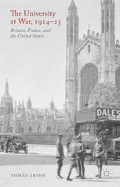Abstract
On 21 July 1921, the foundation stone for the new university library at Louvain was laid. The Times declared that ‘today the eyes of the whole scholastic world are turned upon Louvain and its university.’1 Present at the ceremony were the King and Queen of Belgium, France’s wartime president Raymond Poincaré, Marshal Pétain, numerous ambassadors and ‘hundreds of scholars of distinction’ from French, English, Dutch, and American — but not German — universities. Despite the list of eminent attendees, the foundation stone was laid by America’s self-styled ‘unofficial ambassador to Europe’, Nicholas Murray Butler.2 In context, this was not surprising; Butler had overseen an America-wide campaign to raise university funds towards the reconstruction of the library, while he had also secured money in his capacity as director of Intercourse and Education at the Carnegie Endowment for International Peace. Following the failure of the United States Senate to ratify the Treaty of Versailles which ensured that America would not join the League of Nations, Butler’s continued commitment to Europe made him a figure of significance.
Access this chapter
Tax calculation will be finalised at checkout
Purchases are for personal use only
Preview
Unable to display preview. Download preview PDF.
Notes
Michael Rosenthal, Nicholas Miraculous: The Amazing Career of the Redoubtable Dr. Nicholas Murray Butler (New York, 2006), pp. 245–246.
John Horne and Alan Kramer, German Atrocities 1914: A History of Denial (New Haven, 2001), p. 388.
Brigitte Schroeder-Gudehus, ‘Challenge to Transnational Loyalties: International Scientific Organizations after the First World War’, Science Studies, 3:2 (Apr., 1973), pp. 93–118;
Daniel J. Kevles, ‘“Into Hostile Political Camps”: The Reorganization of International Science in World War I’, Isis, 62:1 (Spring, 1971), pp. 47–60;
A.G. Cock, ‘Chauvinism and Internationalism in Science: The International Research Council. 1919–1926’, Notes and Records of the Royal Society of London, 37:2 (March 1983), pp. 249–288.
Katharina Rietzler, ‘Experts for Peace: Structures and Motivations of Philanthropic Internationalism in the Interwar Years’, in Daniel Laqua ed., Internationalism Reconfigured: Transnational Ideas and Movements Between the World Wars (London, 2011), pp. 45–65;
John Layton Harvey, ‘The Common Adventure of Mankind: Academic Internationalism and Western Historical Practice from Versailles to Potsdam’, Unpublished PhD Dissertation, Pennsylvania State University, 2003; Chatriot, ‘Comprendre la guerre’, pp. 33–44.
Carole Fink, Marc Bloch: A Life in History (Cambridge, 1989), p. 81.
John F. Craig, Scholarship and Nation Building: The Universities of Strasbourg and Alsatian Society 1870–1939 (Chicago, 1984), pp. 204–224.
P. Ladeuze, Le Crime Allemand contre l’Université de Louvain. Les leçons de la guerre (Louvain, 1919), p. 7.
Robert Marc Friedman, The Politics of Excellence: Behind the Nobel Prize in Science (New York, 2001), pp. 100–110.
Fritz Stern, ‘Together and Apart: Fritz Haber and Albert Einstein’, in Stern ed., Einstein’s German World (Princeton, 1999), p. 119.
Stuart Wallace, War and the Image of Germany: British Academics 1914–1918 (Edinburgh, 1988), pp. 195–196.
Mary Nolan, The Transatlantic Century: Europe and America 1890–2010 (Cambridge, 2012), pp. 76–103.
Tamson Pietsch, Empire of Scholars: Universities, Networks, and the British Academic World 1850–1939 (Manchester, 2013), pp. 177–179.
William G Holzberger, Inauguration de l’Institute d’études slaves (Paris, 1923).
Daniel J. Gorman, The Emergence of International Society in the 1920s (Cambridge, 2012), p. 180.
John Horne, ‘Demobilizing the Mind: France and the Legacy of the Great War, 1919–1939’, in Vesna Drapac and André Lambelet eds., French History and Civilization: Papers from the George Rudé Seminar, 2 (2009), pp. 101–107.
Norman Ingram, ‘A la recherche d’une guerre gagnée: The Ligue des Droits de l’Homme and the War Guilt Question (1918–1922)’, French History, 24:2 (2010), p. 229.
Jules Prudhommeaux ed., Enquête sur les livres scolaire d’après guerre (Paris, 1924).
Henri Lichtenberger, Relations between France and Germany (Washington DC, 1923).
Mark Mazower, Governing the World: The History of an Idea (London, 2012), pp. 141–153.
Jo-Anne Pemberton, ‘The Changing Shape of Intellectual Cooperation: From the League of Nations to UNESCO’, Australian Journal of Politics and History, 58:1 (2012), p. 36.
Waldo G. Leland, ‘Some Aspects of International Intellectual Co-operation since the World War’, Advocate of Peace Through Justice, 92:2 (May 1930), p. 114.
Isaacson, Einstein: His Life and Universe (London, 2007), pp. 305–306.
Daniel Laqua, ‘Transnational Intellectual Cooperation, the League of Nations, and the Problem of Order’, Journal of Global History, 6 (2011), p. 235.
Duncan Wilson, Gilbert Murray OM 1866–1957 (Oxford, 1987), p. 352.
Karl Dietrich Erdmann, Towards a Global Community of Historians: The International Historical Congresses and the International Committee of Historical Sciences 1898–2000 (Oxford, 2005), p. 75.
Bryce Lyon, Henri Pirenne: a Biographical and Intellectual Study (Ghent, 1974), pp. 378–384.
Elisabeth Crawford, Nationalism and Internationalism in Science, 1880–1939: Four Studies of the Nobel Population (Cambridge, 1992), pp. 60–61.
Christophe Charle, La République des universitaires: 1870–1940 (Paris, 1994), p. 351.
John Horne, ‘Locarno et la politique de démobilisation culturelle: 1925–1930’, in 14–18 Aujourd’hui, Today, Heute, 5, Démobilisations culturelles après la Grande Guerre (Paris, 2002), pp. 81–83.
Frank Pierrepont Graves, ‘The Story of the Library at Louvain’, Scientific Monthly, 28:2 (February, 1929), p. 139.
Author information
Authors and Affiliations
Copyright information
© 2015 Tomás Irish
About this chapter
Cite this chapter
Irish, T. (2015). Internationalism after the War, 1918–25. In: The University at War, 1914–25. Palgrave Macmillan, London. https://doi.org/10.1057/9781137409461_9
Download citation
DOI: https://doi.org/10.1057/9781137409461_9
Publisher Name: Palgrave Macmillan, London
Print ISBN: 978-1-349-48869-8
Online ISBN: 978-1-137-40946-1
eBook Packages: Palgrave History CollectionHistory (R0)

